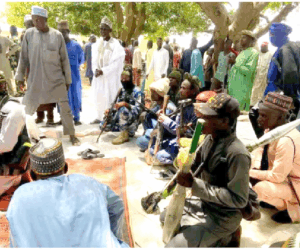From Katsina to Kaduna states in the North West, an alarming trend is emerging: fragile “peace deals” with ruthless bandits brokered from positions of weakness by terrified communities.
In Katsina, for instance, residents of Danmusa, Safana, Jibia and Batsari local government areas, apparently tired of unending raids, ransom demands, rapes, murders and forced conscriptions, have quietly entered so-called peace agreements with bandits to stem the tide of violence. Reports confirm that in these areas, some bandit leaders met with community officials, renounced violence and pledged a truce.
But these developments are far from reassuring!
SPONSOR AD
Take Jibia: despite the recent peace deal, bandits struck again recently and wreaked havoc, including rustling livestock and fleeing before troops could respond, evidently validating the belief that the “truce” with the outlaws is nothing but peace of the graveyard.
Even though leaders of Malumfashi LGA of the same Katsina State have not yet entered into the so-called peace deal with the bandits, the incident of Tuesday, August 19, 2025, when the assailants killed over 50 worshippers during a mosque attack at Gidan Mantau community, is heartbreaking. Locals said the attackers were on a reprisal mission after the community’s members had successfully ambushed them, killing many and seizing their weapons and operational motorcycles.
For now, many LGAs in Katsina are under siege, and the plight of the hapless people, who are being killed on a daily basis, is rarely heard, considering the deafening silence in the media space.
Meanwhile, in Kaduna State, government spin doctors are painting Birnin Gwari LGA as a “success story” of peace deals with bandits. Headlines trumpet repentant bandits seeking forgiveness and peace, but deeper reporting tells a different story.
For instance, just like in Malumfashi, suspected bandits attacked Kakangi community in the western part of Birnin Gwari on August 19, killing five farmers.
Three other villagers reportedly sustained injuries during the attack, and like in Katsina, sources described the assault as a retaliatory mission after local vigilantes from neighbouring Niger State communities killed a suspected bandit on Monday.
Sometime in July, a cleric reportedly held several meetings with Bello Turji and other bandit leaders. The purpose was to negotiate peace and allow farmers access to their land, especially in parts of Zamfara and Sokoto states.
Turji and his group, thereafter, supposedly released some kidnapped victims, many of whom were women and children. They also “surrendered some weapons to demonstrate goodwill”.
Thereafter, the Defence Headquarters (DHQ) said that Turji has not formally surrendered to the military, and the military wasn’t involved in these negotiations.
But then, after the so-called truce, armed bandits loyal to Turji reportedly carried out a series of attacks on communities in Sabon Birni, leaving several people dead and dozens abducted between Wednesday, August 14, and Friday, Aug 16, according to multiple news sources.
For instance, on Wednesday, they laid an ambush for travellers along the Yankasuwa–Masawa road, stopped vehicles and abducted all passengers on board. On Thursday, the gunmen attacked Garki village and abducted 16 persons. One was killed and another managed to escape, while cows were rustled. The attacks continued on Friday when they raided Turtsawa and Faru villages near Sabon Birni, abducting 28 residents.
While those profiting from the fragile “peace deals” may describe some of the recent breaches as isolated cases, recent developments clearly revealed not just the fragility but the absurdity of negotiating with criminal networks that hold all the cards.
A troubling aspect is that even though those in charge of the political and security establishments publicly announce “zero-tolerance” towards bandits and rule out negotiation with them, they nonetheless frame any surrender by the armed groups as voluntary reintegration and appear to rubber-stamp these deals. Videos abound of security personnel observing bandit-community meetings, contradicting civilian leadership and revealing a disturbing policy split.
What is obvious is that the prevalence of these “peace deals” signals that both federal and state governments lack the operational capacity to secure communities. This failure is a glaring betrayal of their constitutional responsibilities.
It is common knowledge that bandit groups aren’t a unified command. They are loose, fractious cells driven by profits in cash, women, and drugs. Negotiating with them gives the edge to criminals. Why would they disarm when they benefit from disjointed peace deals? And who will fund their obsession with drugs after they surrender their arms? For now, these “peace deals” are nothing but incubators for future warlords.
To end the ongoing carnage, the government must go back to the drawing board and address land conflicts, economic marginalisation, arms proliferation, and collapsed local governance. Those in authority must offer justice, not concessions. They must also decimate recalcitrant elements like Bello Turji, while offering genuine reintegration to repentant individuals.
Any dialogue must come from a position of strength because those currently championing the peace deals are evidently doing it from a position of weakness. They must cease pretending to oppose deals by day and endorse them by night. All peace processes must be transparent, legal, and subject to public scrutiny. Most importantly, they must redirect resources into actionable intelligence, rapid response forces, and empowered community security.
These measures are about national survival because, like the Boko Haram menace, banditry, if unchecked, could metastasise across Nigeria. We at the Daily Trust believe in dialogue if it is backed by law, when it is from the position of strength and when it is with proven accountability.







